10 ways to look after your mental health
On World Mental Health Day (10th October), our Head of Mental Health Education, Ezra Hewing, shares these 10 ways to look after your mental health today, and every day.
1. 7/11 Breathing
What strategies do you have for reducing stress, or calming strong emotions like anxiety and anger? You may benefit from learning 7/11 breathing. This means breathing in to a count of 7 and out to a count of 11, which stimulates the body’s relaxation response.
2. Circles of Influence
If you feel that you have little control over events and feel as if life is something which “happens” without you being able to decide for yourself, it can be useful to do an exercise called circles of influence.
– Firstly, draw two circles
– Then in one circle add all of the things we have no control over, such as the weather, world events, other people’s thoughts, feelings and behaviour, and accidents and injuries
– In the second circle, leaving plenty of space, add all of the things you do have control over, such as which socks to wear, which book to start reading, what to eat for lunch or what route to take on a daily walk. You don’t have to do it all at once either – just add something each day to notice what you can control
3. Downtime
Are you getting enough privacy and downtime to process the day? If not, you may find that your first opportunity to think about the day is when you get into bed, which then prevents us from going off to sleep easily.
Try putting ten minutes aside to go for a walk, or sit down quietly somewhere, which allows you to process the day and forget about it before bedtime. If you’re living in a busy environment, seek an agreement that gives everyone a space and time of day to relax and enjoy uninterrupted downtime.
4. Brain food
To keep our brains healthy, our diet needs to include Omega 3 fatty acids. We get Omega 3 from oily fish, such as tuna and salmon, and also eggs, flaxseeds and walnuts. Research shows that increasing the amount of Omega 3 in our diet can help to reduce symptoms of depression.
5. Easy-peasy
Doing something we already know how to do well is a quick way to give us a sense of achievement, which helps to lift mood and boost motivation to do more. It could be colouring in, cooking a favourite meal, taking photos of trees and plants or making paper aeroplanes.
Then, when you’ve had a go, you could choose something more challenging.
6. Memories of mirth
When did you last laugh so hard that tears rolled down your cheeks? Spend a few moments dwelling on that feeling until the memories come back. Now make a note of that memory and any others you may have.
All too often, strong emotions – like anxiety, anger and the feeling of hopelessness which accompanies depression – keep us stuck. When you need to change the way that you feel, spend some time dwelling on the memories of times when you found yourself laughing uncontrollably.
Notice how humour, jokes, comedy and funny experiences help us to break free from stuck patterns and emotions.
7. Get help with trauma
If you think you are experiencing the symptoms of post-traumatic stress disorder, including intrusive thoughts and memories, nightmares, panic attacks and feelings of anxiety, seek help from a counsellor or therapist skilled at treating trauma with the Rewind technique.
8. Helping others helps us
If you feel that you could benefit from having greater meaning & purpose in your life, consider taking up volunteering for a couple of hours a week, or just offer to help out a neighbour or relative. Serving others is, paradoxically, the best way of looking after ourselves.
9. Reframing rigid thinking
Anxious feelings can often lock our attention on a problem, causing us to believe that it will never change or go away. This is sometimes called permanent thinking.
A technique which can help us to get beyond permanent thinking is to write about the problem, or record yourself talking about it, reframing it using words and phrases like ‘yet’, ‘at the moment’ or ‘some of the time’, which open up the possibility for change.
So for example, if we felt that we were never going to find a job again, we might write down the feeling as follows: “I don’t have a job at the moment,” or “I haven’t found a job yet.”
Notice any permanent thoughts which pop up, write them down and see if you can reframe them using ‘yet’, ‘at the moment’ or ‘some of the time’.
10. Getting into your Observing Self
Strong emotions, like anxiety, depression and anger, can trick us into thinking that we are the emotion or mental ill health issue itself. This can then get in the way of appreciating the positive things in our lives which support recovery.
We can see this happening when we hear ourselves and other people say things like, “I’m depressed,” or “I have anxiety.”
Of course, all of us are much more than just depression or anxiety. We all have knowledge, skills, hobbies, interests and life experiences which make up who we are, and which we can draw upon to aid recovery.
Our observing self is one our 9 resources, and is the part of us which can become more aware that we are not just our emotions, feelings and thoughts.
To get into your observing self, practice using the word the when naming your emotions and feelings.
So for example, instead of saying, “I’ve been depressed for six months,” you might say, “the depression has been an issue for six months”. Or, instead of saying “I have anxiety,” we might say, “the anxiety occurs when I feel uncertain about the future.”
When you get into the habit of stepping back from difficult emotions and feelings – using the word the to describe them – you may notice when the depression or the anxiety feel less noticeable too.











